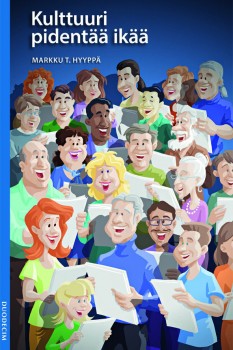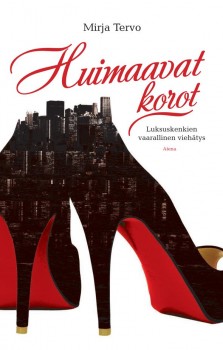Tag: society
Consume culture, live longer!
16 May 2013 | This 'n' that
 A culture freak (and you don’t have to be a vulture) will live longer than a couch potato.
A culture freak (and you don’t have to be a vulture) will live longer than a couch potato.
This sounds pretty obvious, doesn’t it? Watching TV is a passive pursuit, attending choir rehearsals or line dancing class isn’t – and human beings are designed to be active.
But it is also a scientific fact. Neurologist and writer MD Markku T. Hyyppä has been researching the effects of cultural pursuits on health for decades. In his new book Kulttuuri pidentää ikää (‘Culture prolongs your life’) he sets out to prove the power of culture using scientific evidence from many countries.
Cultural capital is a concept that defines the ‘usefulness of culture’. Hyyppä disagrees with the famous sociologist Pierre Bourdieu who defines cultural capital as a means for the upper classes to increase their personal status and power. According to Hyyppä, cultural capital is immaterial, originates from cultural pursuits and the consumption of culture, and brings benefits to all who take part.
Learning the basics of culture in one’s education is vital: Finland has done well in the international PISA exams, but it’s not just because the children are bright. Learning how to educate is important: unlike in many other countries, the arts play a significant role in teacher training in Finland. And arts subjects are important in education: art has a positive effect on emotions and cognition, on emotional life as well as reason. Study arts subjects, and it will be easier to learn maths!
It’s a fact is that those who are socially active in clubs, associations and cultural pursuits in general, live longer than those who are not. Economic status is not a decisive factor here. The efficacy of cultural pursuits and cultural capital on prolonging an individual’s life appears to be based on networking. i.e. social capital. Social capital increases the chances of staying alive – almost as much as non-smoking and much more than the estimated extra time of exercise or losing weight. An individual’s cultural pursuits allow him at least a couple of years more in old age.
Hyyppä also examines and comments on the cultural policies of Finnish political parties. After the Perussuomalaiset – True Finns – party presented its manifesto in 2011, stating that contemporary art should not receive any public funding, as only art that ‘strengthens the national identity’ should be funded, other political parties began hastily to revise and update their dusty arts programmes. As it has been proved in international and Finnish medical research that culture definitely has a positive impact on developing society as a whole, political parties cannot afford to ignore dealing with the subject.
In conclusion, Hyyppä states that Finland would certainly benefit from the cultural added value that manifests itself in well-being, health and a longer life spans. When people live longer healthy, the national economy gains massively.
It’s not just opera, ballet and favouring the paintings of the Düsseldorf school that bring you cultural capital and prolong your existence; rock concerts or pottery classes are fine, too. But, notes Hyyppä, being active in politics in your free time, going to church and participating in spectator sports don’t seem to have a similar positive effect, so might it be better not to concentrate on those alone?
Markku T. Hyyppä
Kulttuuri pidentää ikää
(‘Culture prolongs your life’)
Helsinki: Duodecim, 2013. 132 p.
ISBN 978-951-656-479-4
Where’s life best for women?
14 October 2011 | This 'n' that

Ice, lava & quality life for women: Iceland. Photo: Soila Lehtonen
In Iceland.
The Daily Beast – the online home of Newsweek Magazine – has compiled the rankings of the best and worst countries for women to live in. 165 countries were analysed by using five factors – justice, health, education, economics and politics – and awarding scores of 0 to 100.
Each category included between four and ten data points, depending on the reliable data points available. The results, published last month, show that for a woman Iceland is the best place: overall score was 100.0. Second was Sweden (99.2), third Canada (96.6), fourth Denmark (95.3) and fifth Finland (92.8). The next five were Switzerland, Norway, USA, Australia and the Netherlands.
The final ranking is based on how much better or worse a country is for women when measured against the average level of women’s rights for all 165 countries – of which the worst three are Yemen, Afghanistan and Chad.
Some progress seems to have been going on in the world lately; in politics women have become more visible. They will now even be allowed to vote in Saudi Arabia. (But there women are still not able to leave the country or work without a permission from a male relative – or drive a car.)
Iceland’s current prime minister is Johanna Sigurdardottir; the country’s score points for politics is 92.8, whereas Finland’s is 100.0.
However, justice and economics do not score as high in Finland as in Iceland. ‘Prevalence of intimate partner physical and sexual violence’ may cause the loss of points in the former case, and ‘women’s wages as a percentage of men’s’ in the latter.
Finland is the only country on the list with 100.0 points in politics: currently the president, 84 of the 200 members of the parliament and nine ministers out of 19 are women. So, it might be quite possible that women will make Finland climb up towards the top of the mountain – or rather, volcano?
Best foot forward
14 May 2010 | This 'n' that
 C’est moi. Tribute. Eliza. Muse. Monica. Very Privé, Super Private.
C’est moi. Tribute. Eliza. Muse. Monica. Very Privé, Super Private.
These are names of shoes that women buy in luxury shops on New York’s Fifth Avenue. Six inches or more of heels that cost anything between 500 and 5,000 dollars, make walking torture; but pain is tolerated, as along with the shoes a woman acquires a deeply satisfying feeling of being envied, beautiful and sexy (her toe cleavage has to be clearly visible).
Mirja Tervo (born 1971) is an ethnologist who spent a year and a half selling luxury shoes in Manhattan. Among her fellow sales personnel were a medical doctor, a musician, an actor and a retired baseball pro.
The shoe salon paid no salary, just commission of ten per cent, and the required minimum sale per week was 3,500 dollars. If a sales person failed to sell merchandise worth this sum, he or she was given a loan of 300 dollars, payable immediately when the results improved, and they quickly had to. More…
